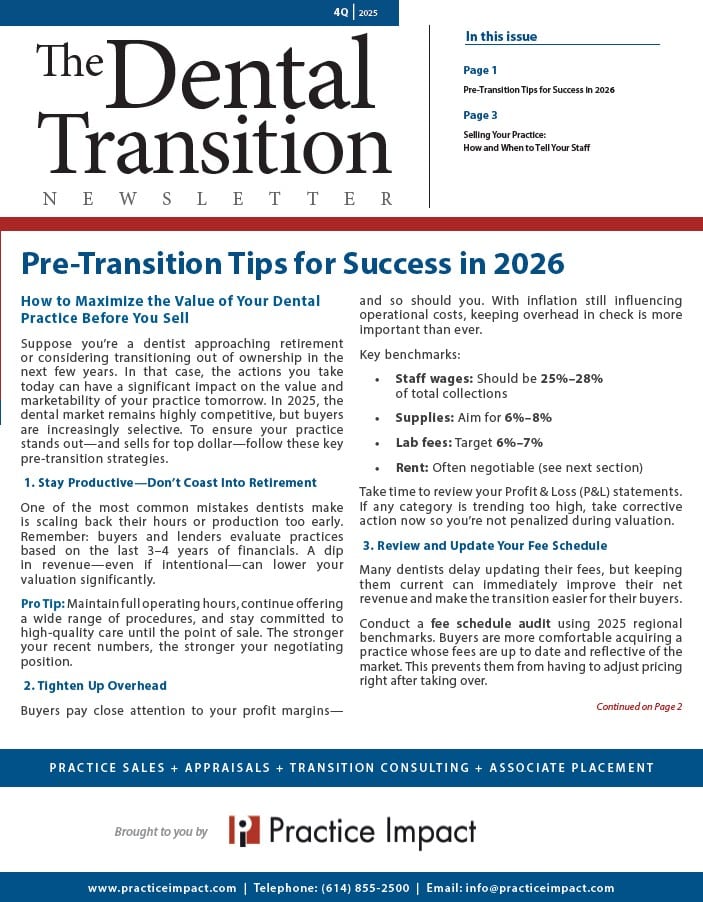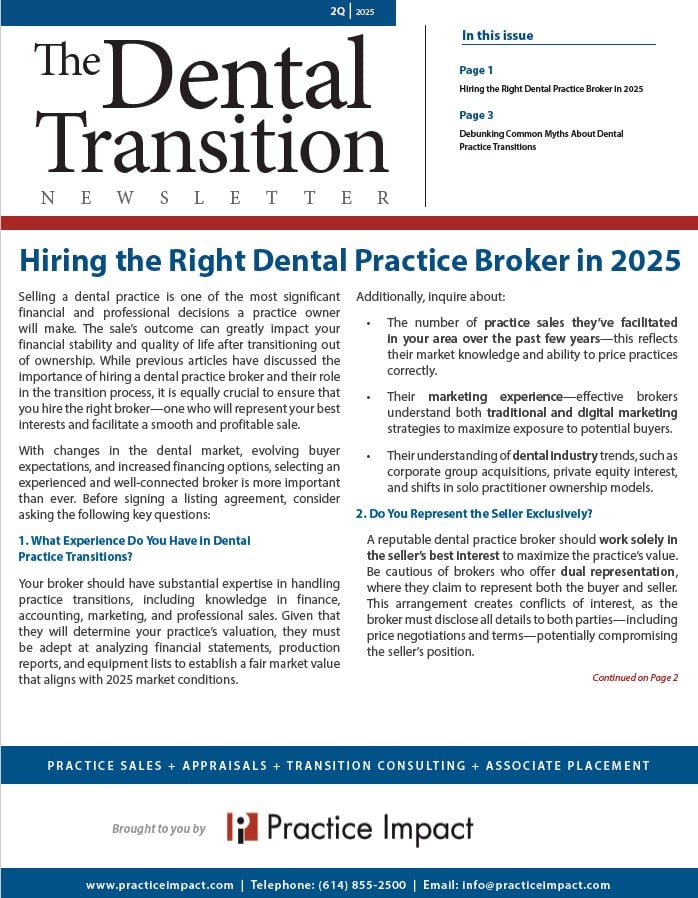The Importance of a Good, but Not Too Well Paid Staff During your Practice Transition
A doctor’s staff is always one of the most important aspects of the practice, especially during a transition. When a doctor sells his practice, the buying doctor wants as much continuity in the practice as possible and therefore wants the staff to stay with the practice. Patients come to know and trust the staff, sometimes even more than the dentist himself so the loss of a key staff member can cause patient loss during the transition. There are always times when it is best for some staff members to leave, but normally it is best to leave the staff in place at least during the first few months after a transition.
Because the staff is so crucial to both the buyer and seller, both parties need to ensure that they are comfortable with the amount of compensation and influence that the staff holds in the office. Practice Impact has handled several transitions in which the staff has hindered or prevented a sale. More times than not, this is not done intentionally by the staff, but it is still an issue. A staff that has very high wages may not be an issue for a selling doctor who has been in practice long enough to handle and accept a lower profit margin, but this can be a problem for a potential buyer who will have higher expenses in the practice. Often times experienced doctors pay their staff well as a reward for doing a good job, being a good employee and for their loyal years of service. This helps to ensure more loyalty to that doctor and decreases the chance of turnover in the staff. It is definitely in a doctor’s best interest to pay his staff well. But, the buying doctor may not be able to afford wages that are higher than the norm, especially since that loyalty may not transfer with the sale of the practice.
Some doctors feel that even if they pay their staff a premium wage that it will not impact the sale because the buyer can reduce salaries or hire a new staff when he takes over. We do not recommend that the buyer immediately change much of the staff during the first 4 -6 months after a transition. The buyer will rely on the staff heavily during the transition until he knows the patients and is comfortable running the office. Obviously, this is not the ideal time to hire and train a new staff member. Even the prospect of keeping the staff during the transition and then replacing them will turn away many buyers, especially first time owners who have never terminated or hired an employee and are not comfortable with the process. It is also difficult for a buyer to reduce staff salaries, especially during the transition. They run a huge risk of losing the staff immediately or very soon after the closing. Chances are that with a salary reduction the employees will start looking for a new job. Even if the seller were to reduce their salary they may consider leaving. Employees have no loyalty to the new buyer so there is absolutely no incentive to stay if they can find another position. Reducing an employee’s salary also decreases their loyalty and motivation to do their job well which is crucial to a buyer during the first months of practice ownership.
On the flip side of this, you also do not want a severely underpaid staff. A low paid staff looks great on your profit and loss statement and will initially attract buyers, but it can lead to questions and problems. Why are the salaries so low? It makes buyers and their advisors wonder if your staff does not have much experience or if they are poor employees or have poor skills. Also, there will eventually be staff turnover. When the buyer hires new employees chances are he will have to pay a higher wage. This causes two problems- expenses will increase thereby causing profits to decrease and it can cause issues and conflict with other employees if the new employee is being paid a high wage, especially when the new person has less experience and seniority. A low paid staff may also be staying with the practice out of loyalty to the selling doctor. When the buyer takes over the staff may be tempted to jump ship in order to find a higher salary. Or they may demand a higher wage from the buyer.
Typically, these issues do not directly impact the selling doctor until he starts to sell the practice so many choose not to worry about them. The problem with this philosophy is that buyers are becoming much more business savvy in today’s world. Buyers are also hiring very skilled advisors such as dental CPA’s and practice management consultants that will look over a practice’s financials before the buyer closes on a practice to ensure that the practice is stable now and will be in the future. A good advisor will foresee issues with staff salaries and warn their client to be wary of buying the practice.
There is no “perfect” practice and every office has its own set of issues when the time comes to sell it. You cannot change the location, type of practice, or value of the real estate in time to transition out of the office. You can, however, limit some of these issues and prepare your practice for an easier sell. Keeping your staff salaries in line with comparable practices is definitely ones of these items that will help to sell your practice in a timely manner. If you have questions regarding where your total salaries should be please contact us a Practice Impact.





